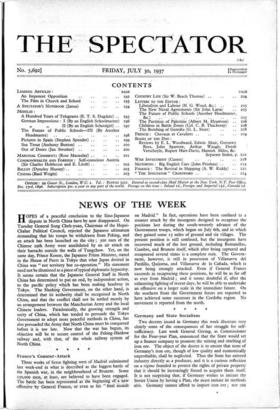NEWS OF THE WEEK
HOPES of a peaceful conclusion to the Sino-Japanese dispute in North China have by now disappeared. On Tuesday General Sung Cheh-yuan, Chairman of the Hopei- Chahar Political Council, rejected the Japanese ultimatum demanding that his troops be withdrawn from Peking, and an attack has been launched on the city ; 5oo men of the Chinese 29th Army were annihilated by an air attack on their barracks outside the walls of Tungchow. Yet, on the same day, Prince Konoe, the Japanese Prime Minister, stated in the House of Peers in Tokyo that what Japan desired in China was " not territory but co-operation." His statement need not be dismissed as a piece of typical diplomatic hypocrisy. It seems certain that the Japanese General Staff in North China has determined to put an end, by independent action, to the pacific policy which has been making headway in Tokyo. The Nanking Government, on the other hand, is determined that its authority shall be recognised in North China, and that the conflict shall not be settled merely by an arrangement between the Manchurian Army and the local Chinese leaders. Paradoxically, the growing strength and unity of China, which has tended to persuade the Tokyo Government to adopt more peaceful methods in China, has also persuaded the Army that North China must be conquered before it is too late. Now that the war has begun, its objective will be to secure control of the Peking-Hankow railway and, with that, of the whole railway system of North China.






































